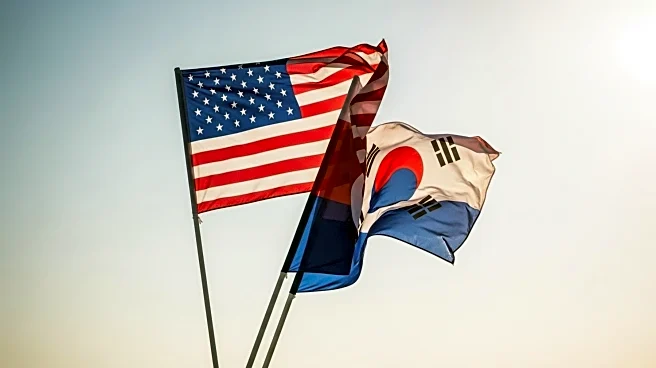What's Happening?
The 75th anniversary of the Incheon Landing, a pivotal event in the Korean War, was marked by celebrations in Incheon, South Korea. The event featured a parade of South Korean and U.S. Marines, amphibious assault demonstrations, and the hoisting of the South Korean flag. These festivities underscore the historical significance of the U.S.-South Korea alliance, which was solidified during the Korean War. However, recent tensions have emerged as the Trump administration imposed heavy tariffs on South Korean exports and arrested several South Korean citizens involved in a factory construction in Georgia. These actions have sparked criticism from some South Koreans, who view the U.S. as overbearing rather than supportive.
Why It's Important?
The U.S.-South Korea alliance is a cornerstone of regional security in East Asia, with significant implications for both countries' political and economic landscapes. The recent tensions highlight the fragility of international alliances in the face of economic and political disagreements. The tariffs and arrests could strain diplomatic relations, potentially affecting trade and military cooperation. South Korea's economic interests are at stake, as the U.S. is a major trading partner. Additionally, the perception of the U.S. as a 'bully' rather than a 'savior' could influence public opinion and policy decisions in South Korea, impacting future collaborations.
What's Next?
The future of the U.S.-South Korea relationship may hinge on diplomatic efforts to resolve these tensions. Both nations might engage in negotiations to address the tariffs and legal issues surrounding the arrests. South Korean leaders could seek to balance maintaining a strong alliance with the U.S. while addressing domestic concerns about sovereignty and economic independence. The outcome of these discussions could set a precedent for how the two countries navigate conflicts in their partnership.
Beyond the Headlines
The situation raises questions about the long-term sustainability of military alliances in a rapidly changing global landscape. The historical context of the Incheon Landing as a symbol of U.S. commitment contrasts with contemporary challenges, suggesting a need for evolving strategies in international relations. The cultural and historical ties between the U.S. and South Korea may be tested as both nations reassess their roles and expectations in the alliance.









